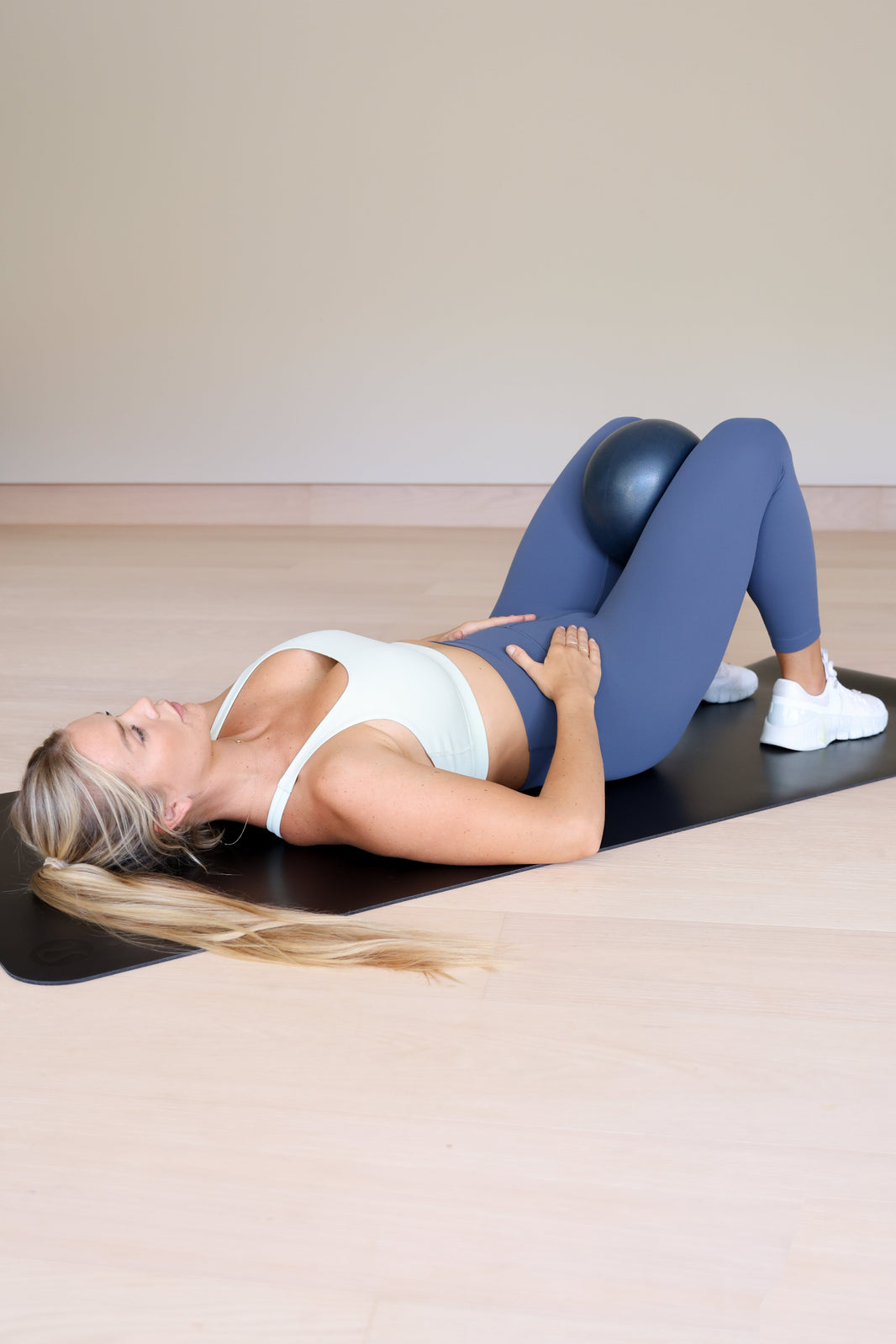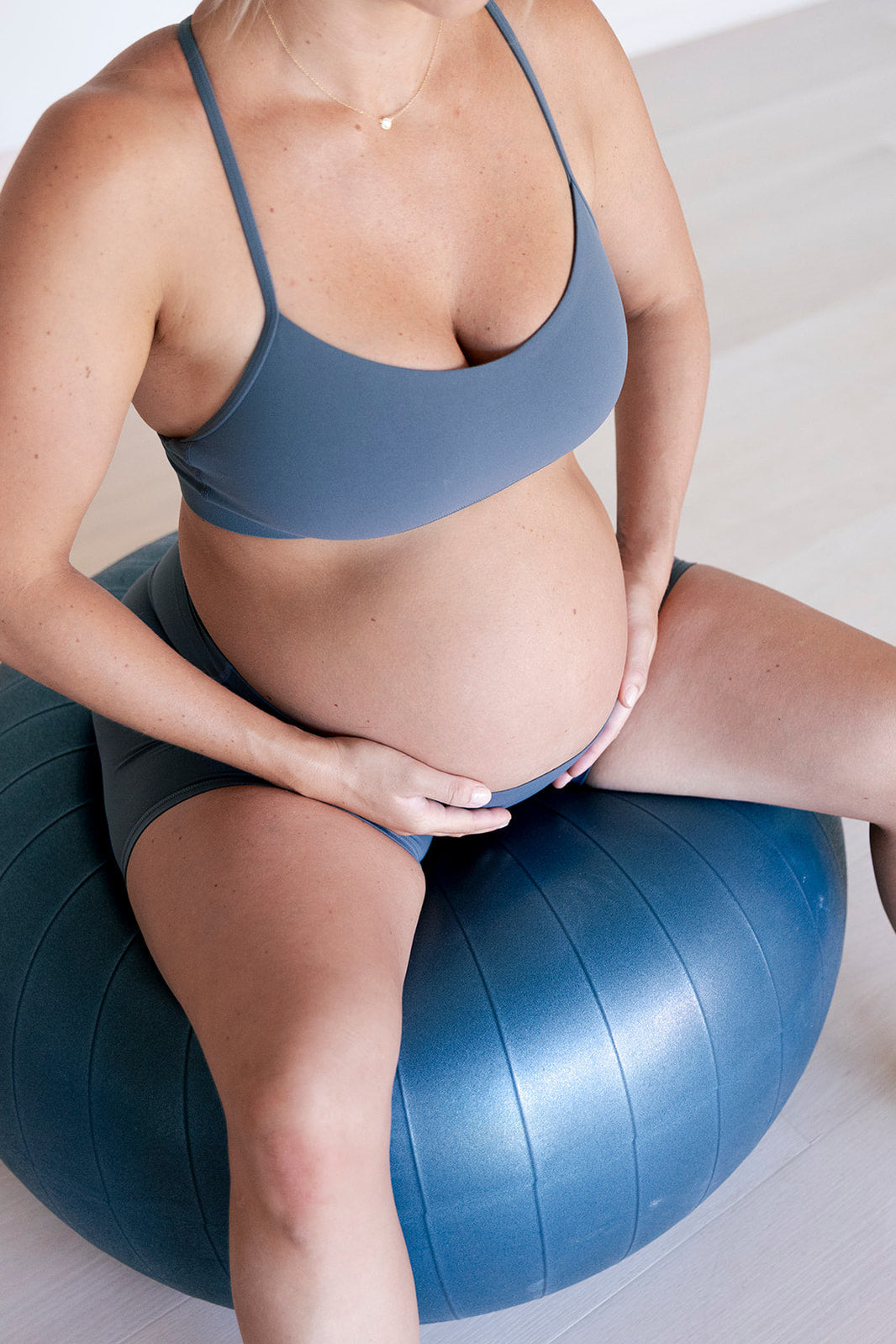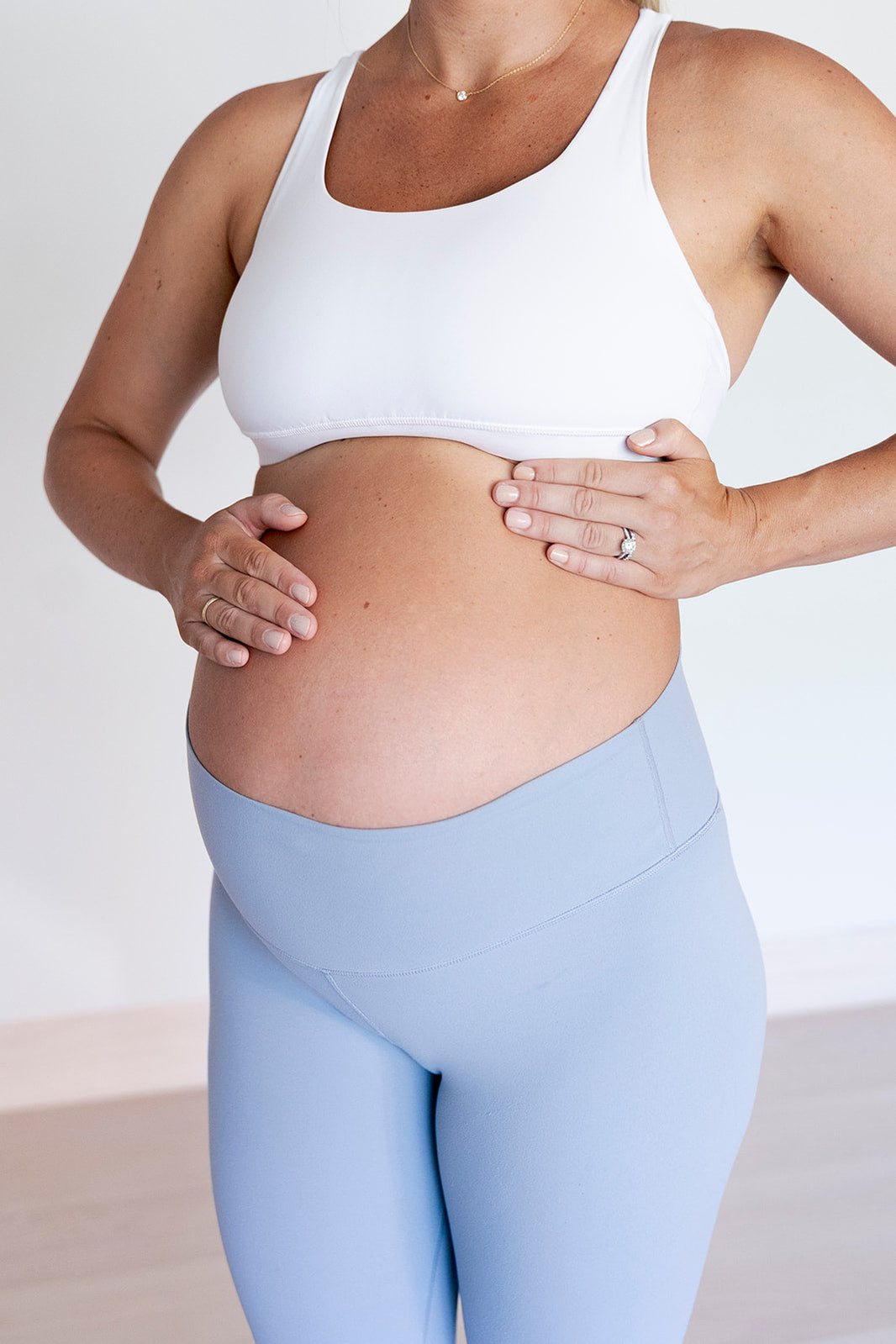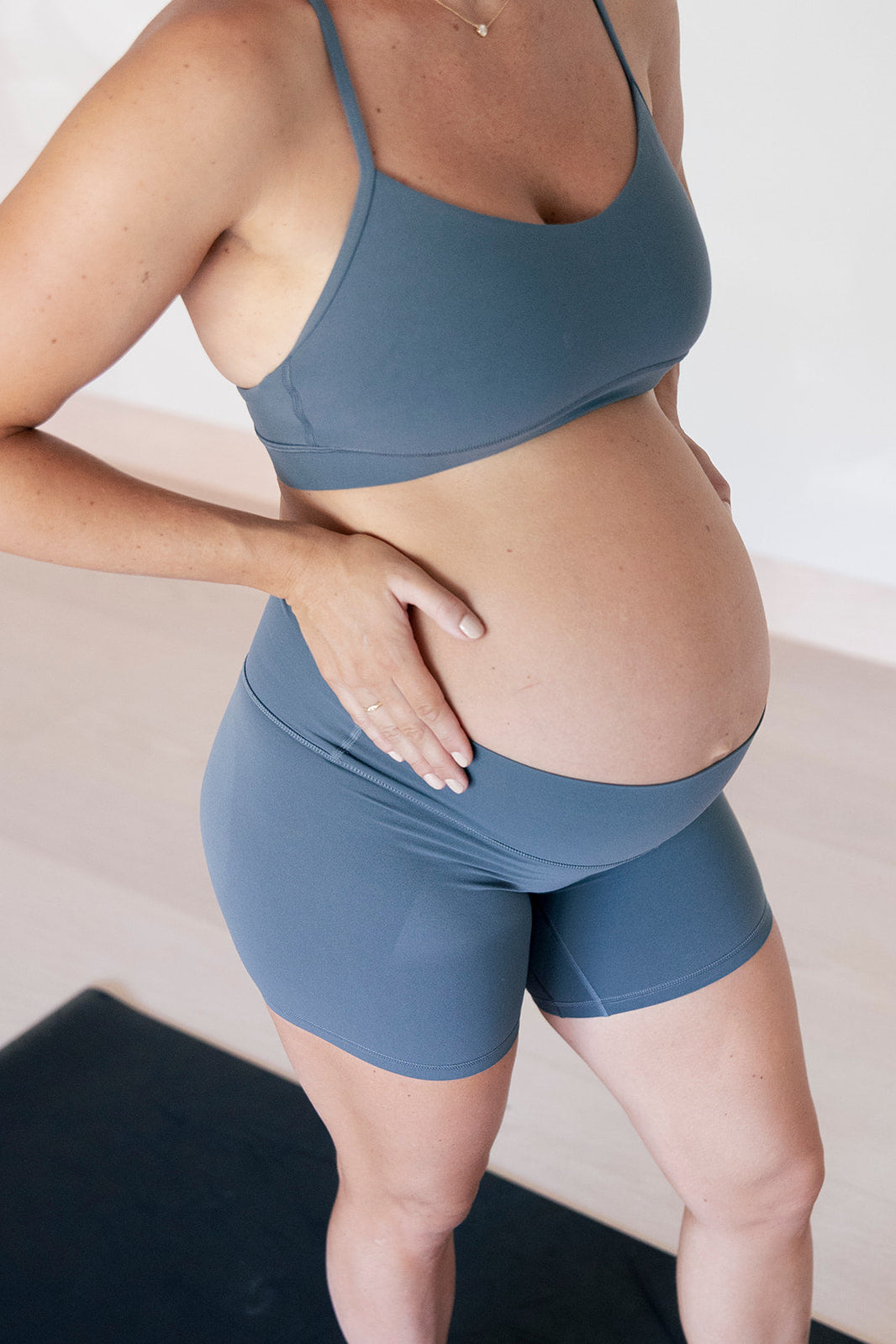We know pregnancy is a wild ride full of changes, excitement, and maybe a little anxiety. But guess what? Staying active during pregnancy can be a game changer for both you and your little one. Let’s dive into how exercise helps, what to watch out for, and why getting moving now can set you up for a smoother postpartum recovery!
Why Should I Exercise During Pregnancy?
Keeping up with regular physical activity during pregnancy offers so many health benefits, many of which extend beyond the duration of pregnancy itself. Exercise has been shown to positively influence both Momma and baby outcomes in ways that enhance overall well-being physically and mentally while also reducing complications.
1. Improved Heart Health
Pregnancy puts additional strain on our heart and cardiovascular system, as the body works to support both momma and baby. Exercise helps to strengthen the heart and improve circulation, which can alleviate some of the cardiovascular strain. This is particularly important in reducing the risk of gestational hypertension and preeclampsia, conditions that can arise from high blood pressure during pregnancy.
A study published found that mommas who engaged in 30-60 min, 2-7 times per week during pregnancy had a lower incidence of hypertensive disorders (1.) This suggests that exercise may play a preventative role in protecting against some of the most dangerous pregnancy complications.
2. Weight Management and Reduced Risk of Gestational Diabetes
Maintaining a healthy and balanced approach to weight gain during pregnancy can support overall well-being and reduce the risk of complications such as gestational diabetes, a condition that affects about 6-9% of pregnant women in the United States. Regular physical activity can contribute to better insulin sensitivity and overall health, which may help lower the risk of developing gestational diabetes.
The American College of Obstetricians and Gynecologists (ACOG) recommends at least 150 minutes of moderate-intensity aerobic activity per week during pregnancy to support overall health and wellness, not much different than those who are not pregnant (2.) A study showed that women with only low intensity exercise or sedentary lifestyle were more at risk for gestational diabetes in pregnancy than those participating in moderate intensity movement/exercise. (3.)
3. Improved Mental Health
Pregnancy is emotionally hard! Hormonal shifts, stress, and anxiety about being a Momma can feel overwhelming. Exercise has been shown to have a positive impact on mental health by releasing endorphins, which are natural mood enhancers. Regular physical activity during pregnancy can reduce the risk of prenatal depression and anxiety.
A multiple study review concluded “…that physical activity plays a significant role in decreasing depressive symptoms in the postpartum period by acting as a natural antidepressant.” This just goes to show the importance of staying active not just for physical health, but for emotional well-being as well. (4.)
4. Healthier Baby
Exercise during pregnancy can also benefit our developing baby. Studies suggest that maternal physical activity may lead to healthier birth weights, better placental function, and even improved brain development in the fetus. Gentle exercise early on can improve blood flow to the baby and help improve fetoplacental growth. (5.)
Wait, I thought I should be careful working out while pregnant?
While exercise is generally helpful during pregnancy, there are times when caution is necessary. Understanding when to modify or avoid certain activities is so important for ensuring both maternal and fetal safety.
1. High-Risk Pregnancies
Certain high-risk conditions may require modifications to exercise routines or even complete avoidance of physical activity. Women with conditions such as preeclampsia, placenta previa after 26 weeks of pregnancy, severe anemia, or a history of preterm labor should talk with their healthcare provider before engaging in exercise. Typically this should already be communicated by your birth provider. In such cases, a customized exercise plan that minimizes risk while maintaining some level of physical activity is ideal.
2. Don’t Bump the Bump
During pregnancy, the body undergoes significant changes, including increased joint laxity due to hormonal shifts. This can make pregnant women more prone to injuries such as sprains and strains. High-impact activities, such as running or jumping, can place additional stress on the joints and should be gone about with caution, particularly in the later stages of pregnancy. If you have been maintaining this level of activity prior to and throughout pregnancy then typically it is advised to go with a symptom based approach and read how you and your body is feeling with these activities.
The biggest recommendation is avoiding any impactful activities that can bump the baby bump. Modifying exercises such as burpees or avoiding power lifting moves that may place extra pressure on your lower pelvis or abdomen is necessary as you are progressing through exercise. Avoiding contact sports all together is also recommended for babies safety through pregnancy.
3. Listening to our Body
Pregnant Mommas should always listen to their bodies and adjust their exercise routines based on how they feel. Symptoms such as dizziness, shortness of breath, chest pain, or vaginal bleeding are signals to stop exercising immediately and seek medical advice. Staying aware of your body and avoiding pushing past physical limits is essential for maintaining safety during pregnancy workouts.
How Exercise During Pregnancy Enhances Postpartum Recovery
One of the lesser-known benefits of exercising during pregnancy is its impact on postpartum recovery. Mommas who maintain a regular exercise routine during pregnancy often experience easier and faster recoveries after childbirth. So let’s talk a little about how exercising during pregnancy can help improve your postpartum recovery!
1. Strengthened Core and Pelvic Floor Muscles
Exercising during pregnancy helps to strengthen the core and pelvic floor muscles, which are essential for postpartum recovery. The pelvic floor muscles support the uterus, bladder, and bowels, and can become weakened or injured during pregnancy and childbirth. The core muscles help support our body and back as we walk around throughout the day and help assist our pelvic floor muscles in pelvic support. Strengthening these muscles functionally through regular exercise can prevent issues such as urinary incontinence, pelvic organ prolapse, back pain, and overall problems that come in the postpartum period. Going into the 6 weeks of less physical activity during the postpartum period can be easier when our muscles are stronger and more bulked up prior to giving birth.
2. Faster Return to Fitness
Women who exercise throughout pregnancy are more physically capable to return to the exercise they were completing during pregnancy without significant risk of injury. This is due to the preservation of muscle strength, cardiovascular endurance, and flexibility during the pregnancy period. It can be assumed that women who engage in regular exercise throughout pregnancy may have a shorter recovery times and a quicker return to physical activity postpartum due to entering postpartum at an elevated physical fitness. With that being said, it is still recommended to hold on any high intensity exercise throughout first 6 weeks postpartum and to collaborate with your medical provider.
3. Easier Labor and Delivery
Women who maintain a regular exercise routine during pregnancy often experience shorter and less complicated labors. Exercise helps to improve endurance, flexibility, and strength, which can make the physical demands of labor more manageable pain wise . Additionally, studies have shown that those participating in regular exercise are more likely to have shorter duration of active stage labor than those who do not exercise through pregnancy (6.)(7.)
Exercise during pregnancy is not only safe for most mommas, but it also offers numerous benefits for both momma and baby. From improving cardiovascular health and managing weight gain to enhancing mental health and supporting baby development, staying active during pregnancy is an incredibly important part of a healthy pregnancy journey. Finally, the benefits of exercise extend into the postpartum period, helping in recovery and reducing the risk of complications such as postpartum depression.
References:
1. BMC Pregnancy and Childbirth, [Magro-Malosso ER, Saccone G, Di Tommaso M, Roman A, Berghella V. Exercise during pregnancy and risk of gestational hypertensive disorders: a systematic review and meta-analysis. Acta Obstet Gynecol Scand. 2017 Aug;96(8):921-931. doi: 10.1111/aogs.13151. Epub 2017 May 19. PMID: 28401531.]
2. American College of Obstetricians and Gynecologists (ACOG), [https://www.acog.org/womens-health/faqs/exercise-during-pregnancy]
3. Mishra S, Kishore S. Effect of Physical Activity during Pregnancy on Gestational Diabetes Mellitus. Indian J Endocrinol Metab. 2018 Sep-Oct;22(5):661-671. doi: 10.4103/ijem.IJEM_618_17. Erratum in: Indian J Endocrinol Metab. 2018 Nov-Dec;22(6):866. doi: 10.4103/2230-8210.246857. PMID: 30294578; PMCID: PMC6166569.
4. N Fotso M, Gonzalez NA, Sanivarapu RR, Osman U, Latha Kumar A, Sadagopan A, Mahmoud A, Begg M, Tarhuni M, Khan S. Association of Physical Activity with the Prevention and Treatment of Depression During the Postpartum Period: A Narrative Review. Cureus. 2023 Aug 31;15(8):e44453. doi: 10.7759/cureus.44453. PMID: 37791151; PMCID: PMC10544133.
5. Clapp JF 3rd, Kim H, Burciu B, Lopez B. Beginning regular exercise in early pregnancy: effect on fetoplacental growth. Am J Obstet Gynecol. 2000 Dec;183(6):1484-8. doi: 10.1067/mob.2000.107096. PMID: 11120515.
6. Rodríguez-Blanque R, Sánchez-García JC, Sánchez-López AM, Aguilar-Cordero MJ. Physical activity during pregnancy and its influence on delivery time: a randomized clinical trial. PeerJ. 2019 Feb 7;7:e6370. doi: 10.7717/peerj.6370. PMID: 30775175; PMCID: PMC6371916.
7. Watkins VY, O'Donnell CM, Perez M, Zhao P, England S, Carter EB, Kelly JC, Frolova A, Raghuraman N. The impact of physical activity during pregnancy on labor and delivery. Am J Obstet Gynecol. 2021 Oct;225(4):437.e1-437.e8. doi: 10.1016/j.ajog.2021.05.036. Epub 2021 Jun 1. PMID: 34081895; PMCID: PMC10564562.








